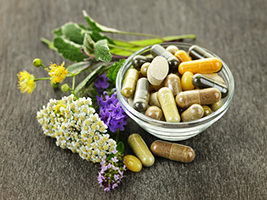 The popularity of alternative herbal remedies and supplements is increasingly growing all over the world.
The popularity of alternative herbal remedies and supplements is increasingly growing all over the world.
From various health literature and natural health websites such as Blue Heron Health News, we learn which herbal supplements help to tackle different health conditions.
Common illnesses such as high blood pressure, cholesterol, diabetes, insomnia and many others can be greatly alleviated and even cured using herbs provided by nature itself.
However, according to a new study from the University of Guelph’s Biodiversity Institute of Ontario, some herbal supplements on the market today contain unlisted, substances and additives that can be dangerous to our health.
These herbal supplements should be avoided at all cost.
Ontarian researchers revealed a shocking discovery: almost 60 percent of herbal supplements sold today contain substances that are not listed in the ingredient list.
What’s more surprising is that in nearly one third of investigated herbal supplements, the prime ingredient was replaced with a completely different product!
Almost 20 percent of herbal supplements contained various unlisted fillers like wheat, soybeans and rice.
The study investigated 12 companies that produce herbal supplements and only two of them did not use any fillers, unlisted additives and contaminants in their products (researchers did, unfortunately, not reveal which companies were good and bad).
Researchers explain that the unlisted ingredients could pose serious health hazards to consumers. Various herbal supplements are not recommended for long term use and could interfere with other health conditions.
Moreover, there is a high risk for consumers suffering different types of allergies, as some products were found to be contaminated with walnut leaves and gluten.
This may explain why some studies have “proven” various herbal remedies useless for conditions, even if it’s a well-known fact that the true herb actually works.
In the US, there is still very little control over these herbal products. They are considered as a dietary supplement, and unlike medicines, do not need the approval of the FDA.
Good advice is to not only carefully examine the herbal product you buy, but also research very well the reputation of the company that produces these herbal supplements.
Oftentimes it’s better to invest in a good quality organic product rather than a cheaper product that only provides false security.
Any kind of processed pills carry some kind of risk of side effects. It’s therefore always best to seek health in a natural lifestyle and diet.
Here are tips on how to tackle various diseases without drugs or herbs:

 Overcoming IBD
Overcoming IBD Multiple Sclerosis
Multiple Sclerosis Banishing Bronchitis
Banishing Bronchitis Gum Disease Gone
Gum Disease Gone Overcoming Onychomycosis
Overcoming Onychomycosis Neuropathy No More
Neuropathy No More The Prostate Protocol
The Prostate Protocol Brain Booster
Brain Booster
 Ironbound
Ironbound
 Solution for Shingles
Solution for Shingles
 The Bone Density Solution
The Bone Density Solution
 The Ultimate Healing Protocol
The Ultimate Healing Protocol
 The Parkinson's Protocol
The Parkinson's Protocol
 The Chronic Kidney Disease Solution
The Chronic Kidney Disease Solution
 Overthrowing Anxiety
Overthrowing Anxiety The Fatty Liver Solution
The Fatty Liver Solution The Hypothyroidism Solution
The Hypothyroidism Solution
 The End of Gout
The End of Gout The Blood Pressure Program
The Blood Pressure Program
 The Oxigized Cholesterol Strategy
The Oxigized Cholesterol Strategy
 Stop Snoring And Sleep Apnea Program
Stop Snoring And Sleep Apnea Program
 The Arthritis Strategy
The Arthritis Strategy The Vertigo & Dizziness Program
The Vertigo & Dizziness Program The 3-Step Diabetes Strategy
The 3-Step Diabetes Strategy Hemorrhoids Healing Protocol
Hemorrhoids Healing Protocol The Erectile Dysfunction Master
The Erectile Dysfunction Master Weight Loss Breeze
Weight Loss Breeze The IBS Program
The IBS Program The Insomnia Program
The Insomnia Program The Migraine and Headache Program
The Migraine and Headache Program The Neck Pain Solution
The Neck Pain Solution The Menopause Solution
The Menopause Solution The Ejaculation Master
The Ejaculation Master The TMJ Solution
The TMJ Solution The Acid Reflux Solution
The Acid Reflux Solution The Fibromyalgia Solution
The Fibromyalgia Solution The Psoriasis Strategy
The Psoriasis Strategy